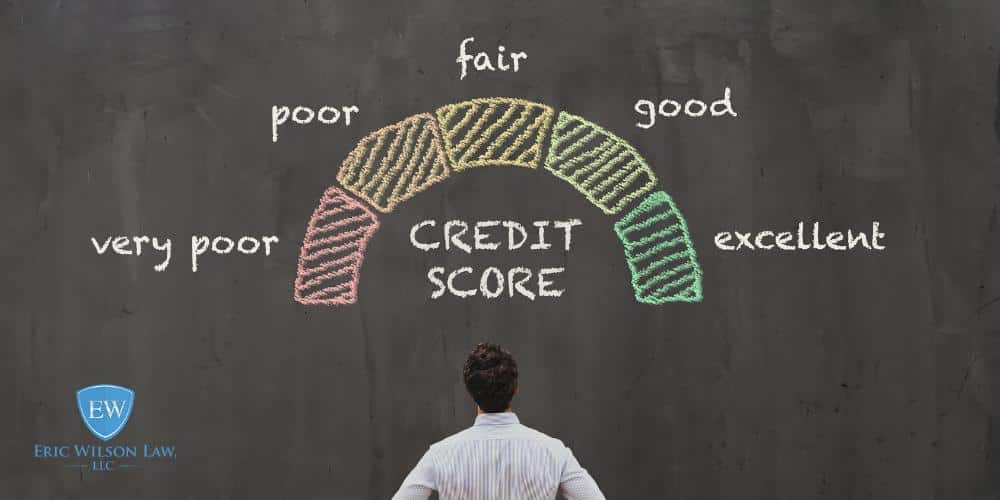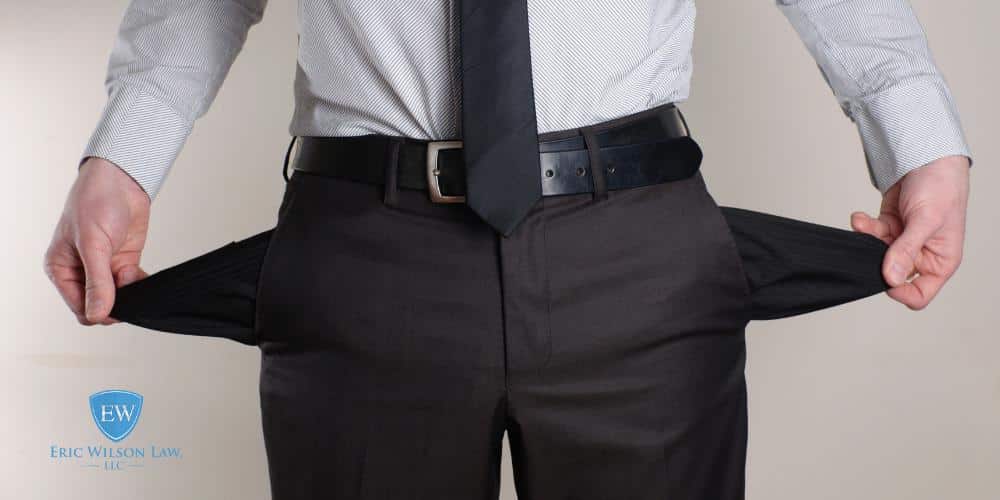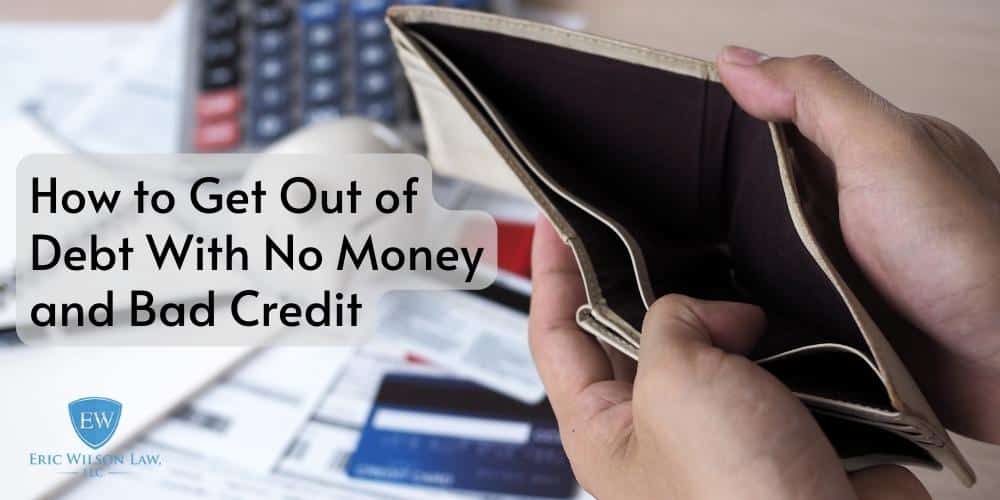In this economy, many of us are in the same boat: tiny paychecks and big expenses. Unexpected emergencies – such as medical crises, broken appliances, home or car damage, etc. – can make this situation so much worse. As a result, many Americans find themselves living paycheck to paycheck with lots of debt and poor credit. This kind of financial situation is incredibly stressful and not a good way to live. That’s why the legal team at Eric Wilson Law is so passionate about teaching their clients how to get out of debt with no money and bad credit.
If you’re wondering which debt relief option is best for you and your financial situation, call Eric Wilson at 205-349-1280 today.
How Much Debt is Too Much?
If you’re struggling financially, it can be difficult to understand how bad your situation really is because you’re just going through the motions. So you may be wondering: how much debt is too much? There are a few red flags that can signal that your debt is out of control:
- Having a credit utilization ratio over 30%
- Having a debt to income ratio over 43%
- Making minimum payments on your credit card debt every month
- Maxing out credit cards
- Using credit cards for cash advances
- Having credit card balances that are much higher than your other bills
Consequences of Too Much Debt
If you’re struggling with one or more of the aforementioned red flags, then you likely feel like you’re treading water. You’re exhausted, stressed, and feeling like you’re about to go under. This is no way to live your life. On top of chronic stress and exhaustion, you may be experiencing these consequences related to your debt:
- Living paycheck to paycheck
- Struggling to pay for groceries, gas, rent and other necessities
- Having poor credit history and/or a poor credit score
- Having really high interest rates on your credit card debt
- Going into collections for missed and late payments
- Creditor harassment
- Facing a judgment from a creditor
- Not being able to qualify for personal loans, auto loans, home equity loans, etc.
- Car repossession
- Home foreclosure
- Wage garnishment and/or bank garnishment
If any of this sounds similar to your situation, it’s time to reach out for help. Eric Wilson Law is Tuscaloosa’s top debt relief agency. We can look at your financial situation with fresh eyes and help you determine the best debt management plan to reduce your stress levels and rebuild your credit.
What is Considered Bad Credit?
Similarly to the debt situation, you may be wondering what is considered “bad credit.” The best way to tell if you have bad credit is to look at your credit score. Most people use FICO Score and VantageScore. In order to get an idea of what your credit score is looking like, request a free credit report from one of the three major credit bureaus: Equifax, Experian, and TransUnion.
FICO Scoring Model
The FICO Score model ranges from 300 to 850:
- Poor: 300-579
- Fair: 580-669
- Good: 670-739
- Very Good: 740-799
- Exceptional: 800-850
In 2021, the average FICO credit score was 716, which falls in the “good” range.
VantageScore Model
The VantageScore model also ranges from 300 to 850:
- Very Poor: 300-499
- Poor: 500-600
- Fair: 601-660
- Good: 661-780
- Excellent: 781-850
In 2021, the average VantageScore was 698, which falls in the “excellent” range.
Consequences of Bad Credit
Whether we like it or not, credit reports and credit scores are a big deal in this economy. Living a happy, financially stable, and low-stress life often hinges on having good credit. If you have bad credit, you may struggle from one or more of the following issues:
- Difficulty getting loans: a secured loan, an auto loan, a home equity loan, a personal loan, etc.
- Limited renting options
- Difficulty buying a house
- Higher insurance costs
- Difficulty getting some types of jobs, such as a job in the financial management industry
- Paying deposits for utilities (as a sort of “insurance” just in case you don’t pay your bills)
- Difficulty starting a business

How to Get Out of Debt With No Money and Bad Credit
If you find yourself frantically Googling: how to get out of debt with no money and bad credit – you’re not alone. The good news is that there are still plenty of debt relief options out there if you’re short on cash and struggling to boost your credit score.
Filing for Bankruptcy
Filing for bankruptcy is a last resort option for many people drowning in debt, mostly because it gets a bad rap.
Depending on the type of bankruptcy you file (Chapter 7 and Chapter 13 are the most common among Americans), you can watch the majority of your unsecured debt disappear in as little as 90 days. After that, you essentially have a clean slate to start over and build the life you deserve.
Many peoples’ biggest hang up about bankruptcy is that it can stay on your credit report for 7 to 10 years – and therefore – bring down your credit score. It is true that bankruptcy can stay on your credit report for 7 to 10 years – and affect your credit score – but it’s important to realize that all of that debt will probably hurt your credit way more than a bankruptcy filing will. Even if you do have bankruptcy on your credit report, you will have a much easier time bringing up your credit score to a “good” range without all that debt weighing you down.
For more information on if bankruptcy is a good option for you and your financial situation, contact Eric Wilson in Tuscaloosa, AL.
Debt Consolidation
Consolidating debt is a very popular debt relief option. The best way to consolidate debt is by getting a debt consolidation loan, which – you guessed it – can be very difficult for people with bad credit. It is still possible to get a debt consolidation loan with bad credit, but it may be more trouble than it’s worth. You may have to get a co-signer or get your credit score up into the “good” range before you can reap the benefits of debt consolidation loans.
If your credit score is in the “good” range, you can get a debt consolidation loan for a low interest rate – around 7% APR. But interest rates go way up if your credit score is in the “fair” range or lower – around 15% to 20% APR.
If you believe that debt consolidation is a good option for you and your financial situation, it’s important to know how it works. Debt consolidation works by using a personal loan with a low interest rate to pay off your debts. In order to get approved for a debt consolidation loan, you must have a stable job, a good credit score, and good home equity. Over the course of the next 3 to 5 years, you will pay off this loan through monthly payments. If you don’t miss payments and you keep living within your means, you could be virtually debt free in a few years.
Debt Management Program
Debt management plans are generally better options for people with bad credit. There are no loans with high interest rates or strict qualifications involved. In a debt management plan, a nonprofit debt management or a nonprofit credit counseling agency helps you set up monthly debt payments until your debt is paid off. Once you pay the credit counselor or the agency, they will pay your creditors a set amount. The agency will also help you set a budget so that you can live within your means and pay off debt faster. If you keep up with the monthly payments, you could be largely debt free in 3 to 5 years.
Debt Settlement
Debt settlement is when a creditor agrees to accept less than the amount you owe on your debt as full payment. Debt settlement companies and bankruptcy lawyers – like Eric Wilson – can negotiate with the creditor in order to make this work. Of course, it is possible to negotiate with creditors yourself, but this can be incredibly risky, especially if you don’t know what you’re doing. It’s always best to hire a professional to do this for you.
Debt settlement comes with a high risk of failure. Your credit may get worse, you may face lots of penalties and interest while you wait for an agreement, you may rack up more debt while waiting for an agreement, you may have to pay lots of fees (especially if you’re working with a debt relief company), and your forgiven debt may get taxed in the end. For many people, this debt relief option has many more risks than benefits.
The Snowball Method
The Snowball Method is another popular – and less risky – way of paying off debt if you have bad credit. This is how it works: you fully pay off your smallest debts first, and then you use the money that you used to pay off your small debts to pay off your bigger debts. You keep going with this cycle until multiple debts are paid off – smallest to biggest. Imagine rolling a snowball down a snowy hill: it gradually gets bigger and bigger as more snow keeps getting added to it during the rolling process.
The debt snowball method is basically the opposite of the debt avalanche method – where you pay off big, high interest debt first.
The Island Approach
The main goal of the Island Approach is to reduce interest rates and create more financial responsibility which can help you pay off debt faster. This is how it works: you use different credit cards for different types of expenses. Each type of payment and expense is basically its own “island” because it’s on its own credit card.
For example, you can keep a revolving balance on one card and all of your daily expenses (gas, household supplies, etc.) on another card. That way you can pay off your daily expenses card in full every month, so that you can eventually save money on high interest rates. The money that you would spend on high interest rates can go towards your debt.
Loans from Family and Friends
Last but not least, you can ask a loved one for a personal loan. Personal loans from family and friends usually don’t come with high interest rates and the stress of loan approval. That way, you can fully focus on regaining control over your finances. The main downside to this debt relief method is that if you don’t pay back the loan within an agreed amount of time, you could experience significant strain on your relationship. So if you borrow money from a loved one, do what you can to pay them back whenever you get your finances under control.

Call Tuscaloosa Bankruptcy Lawyers at Eric Wilson Law Today
If you’re struggling with lots of debt and bad credit, it’s crucial to discuss your debt relief options with a professional like Eric Wilson. He has more than 25 years of experience in helping his clients pay off their debts, save money, and fix their credit reports in the process. Call 205-349-1280 to schedule a free consultation with the team at Eric Wilson Law today.


